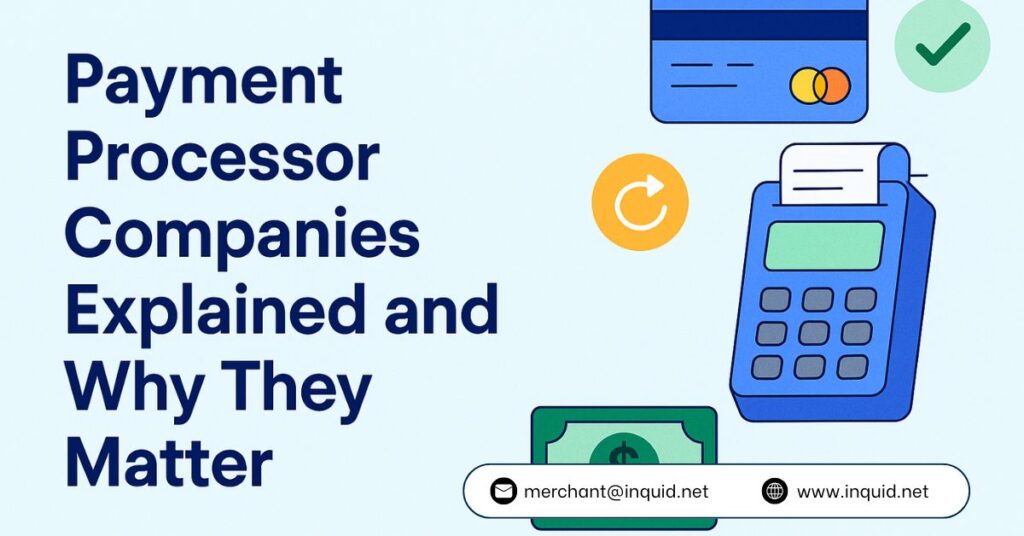
When you buy something online or swipe your card at a store, there’s a complex system working quietly in the background. Payment processor companies are at the heart of this system. They play a crucial role in making sure money moves safely and correctly between buyers and sellers. This article will explain what these companies do and why their role is important for businesses and customers alike.
What Are Payment Processor Companies?
Payment processor companies are businesses that handle the technical details of payment transactions. When you use a credit card, debit card, or digital wallet, these companies take the payment information and communicate with banks and card networks to authorize and complete the payment.
For example, if you own an online store, you might work with a payment processor company to accept payments. The processor will handle the transaction behind the scenes — checking if the customer’s card is valid, confirming if they have enough funds, and finally transferring money to your business account.
How Payment Processor Companies Work
Payment processors serve as the middlemen between merchants, banks, and customers. Here’s a simplified look at the steps involved:
- Customer Initiates Payment: You enter your card details on an online store or swipe your card at a terminal.
- Data Transmission: The payment processor securely sends this information to the customer’s bank or card issuer.
- Approval or Decline: The bank checks if the transaction can proceed based on available funds and fraud detection.
- Transaction Completion: The payment processor informs the merchant if the payment is approved, and funds are transferred.
This entire process happens in just seconds, yet it requires a secure and reliable system to keep transactions safe.
Why Payment Processor Companies Matter for Businesses
Choosing the right payment processor company is important for business success. Here’s why:
Reliable Transactions
When you rely on a payment processor company with a solid reputation, you reduce the chance of failed transactions or errors that can frustrate customers. A smooth checkout process encourages repeat business and builds trust.
Security and Fraud Protection
Payment processor companies invest heavily in security measures. They help protect sensitive customer data and detect fraudulent activities early on. For businesses, this means fewer chargebacks and less risk of financial loss.
Handling Different Payment Methods
Today’s customers expect multiple payment options—from credit cards to mobile wallets. Payment processors support a variety of methods, making it easier for businesses to accept payments from a wider audience.
Integration With Other Systems
Many payment processors offer additional services like billing and subscription management. Some also provide integration with online shopping platforms, accounting software, or even high-risk payment solutions. For example, businesses in sectors like travel or gaming can use high-risk payment processing to handle their transactions securely.
The Difference Between Payment Processors and Payment Gateways
It’s common to mix up payment processors with payment gateways, but they are not the same. A payment gateway is the technology that captures and sends your payment data securely during an online transaction. The payment processor, on the other hand, handles the backend processing of that transaction.
For businesses running online stores, using both is essential. You can learn more about payment gateways and how they work by visiting this page.
How to Choose a Payment Processor Company
With many options out there, finding the right payment processor can feel overwhelming. Here are a few tips to help:
- Look at Fees: Different processors charge different fees, including setup, per-transaction, and monthly fees. Make sure you understand the total cost.
- Check Supported Payment Methods: Ensure the processor supports the payment types your customers prefer.
- Consider Security Features: PCI compliance and fraud detection tools should be part of the package.
- Evaluate Customer Support: Reliable support can save time if you face any technical issues.
- Think About Your Business Type: Some payment processors specialize in specific industries or handle high-risk payments better.
If you want personalized advice or want to discuss options, you can always contact the experts at inquid.
Why Payment Processor Companies Matter to Customers
While businesses benefit from using payment processors, customers also gain in several ways:
- Speed: Transactions are processed quickly, so you get confirmation almost instantly.
- Convenience: Multiple payment options allow you to pay the way you prefer.
- Security: Payment processors work to keep your payment data safe from theft.
- Trust: Knowing a merchant uses a reputable payment processor makes you feel safer about your purchase.
Final Thoughts
Payment processor companies might operate behind the scenes, but their role is vital in today’s commerce environment. They make sure payments are handled correctly, safely, and quickly—benefiting both merchants and customers.
Whether you run a brick-and-mortar store or an online business, understanding how these companies work can help you make better decisions. If you want to explore payment processing services or need help setting up a secure system, consider reaching out to inquid, a company focused on helping businesses with customized payment solutions.
